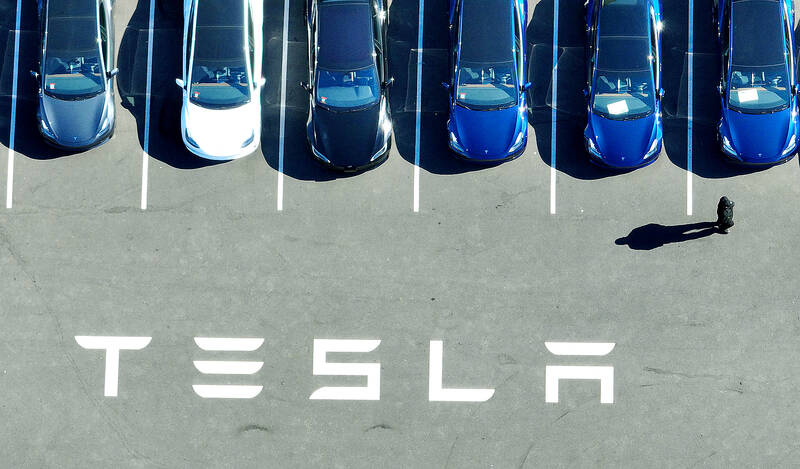Tesla Inc yesterday announced price cuts for its electric vehicles in Taiwan, following recent markdowns in China, Japan, South Korea, Australia and the US to boost buying interest amid weakening global demand.
The Model Y Performance edition, one of its best-selling vehicles in Taiwan, saw the steepest price cut of NT$220,000 (US$7,402) to about NT$2.38 million, information on Tesla’s Web site showed.
The price of the Model Y Long Range version has been lowered by NT$180,000 to about NT$2.12 million, it said.

Photo: AFP
As for its Model 3 series, the price of the RWD version has been cut by NT$60,000 to about NT$1.7 million, while the prices of the Model 3 Long Range version and the Performance version were lowered by NT$149,100 and NT$200,000 to about NT$2.08 million and NT$2.27 million respectively.
The US company said the price cuts would apply to vehicles that have not yet been delivered to buyers.
On Jan. 6, Tesla announced price cuts for its models on sale in China, the second markdown in three months, but the company did not take similar action in Taiwan before the Lunar New Year holiday, which ended on Sunday.
Tesla is the favorite electric-vehicle brand in Taiwan. In the fourth quarter of last year, the company sold more than 4,500 units in the Taiwanese market, marking a new quarterly sales record for any electric vehicle brand in the local market.
Last year, Tesla posted a 95 percent year-on-year increase in sales in Taiwan to more than 11,000 units.

Sweeping policy changes under US Secretary of Health and Human Services Robert F. Kennedy Jr are having a chilling effect on vaccine makers as anti-vaccine rhetoric has turned into concrete changes in inoculation schedules and recommendations, investors and executives said. The administration of US President Donald Trump has in the past year upended vaccine recommendations, with the country last month ending its longstanding guidance that all children receive inoculations against flu, hepatitis A and other diseases. The unprecedented changes have led to diminished vaccine usage, hurt the investment case for some biotechs, and created a drag that would likely dent revenues and

Macronix International Co (旺宏), the world’s biggest NOR flash memory supplier, yesterday said it would spend NT$22 billion (US$699.1 million) on capacity expansion this year to increase its production of mid-to-low-density memory chips as the world’s major memorychip suppliers are phasing out the market. The company said its planned capital expenditures are about 11 times higher than the NT$1.8 billion it spent on new facilities and equipment last year. A majority of this year’s outlay would be allocated to step up capacity of multi-level cell (MLC) NAND flash memory chips, which are used in embedded multimedia cards (eMMC), a managed

CULPRITS: Factors that affected the slip included falling global crude oil prices, wait-and-see consumer attitudes due to US tariffs and a different Lunar New Year holiday schedule Taiwan’s retail sales ended a nine-year growth streak last year, slipping 0.2 percent from a year earlier as uncertainty over US tariff policies affected demand for durable goods, data released on Friday by the Ministry of Economic Affairs showed. Last year’s retail sales totaled NT$4.84 trillion (US$153.27 billion), down about NT$9.5 billion, or 0.2 percent, from 2024. Despite the decline, the figure was still the second-highest annual sales total on record. Ministry statistics department deputy head Chen Yu-fang (陳玉芳) said sales of cars, motorcycles and related products, which accounted for 17.4 percent of total retail rales last year, fell NT$68.1 billion, or

In the wake of strong global demand for AI applications, Taiwan’s export-oriented economy accelerated with the composite index of economic indicators flashing the first “red” light in December for one year, indicating the economy is in booming mode, the National Development Council (NDC) said yesterday. Moreover, the index of leading indicators, which gauges the potential state of the economy over the next six months, also moved higher in December amid growing optimism over the outlook, the NDC said. In December, the index of economic indicators rose one point from a month earlier to 38, at the lower end of the “red” light.